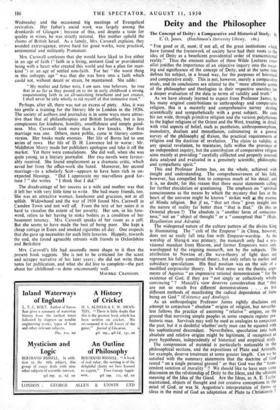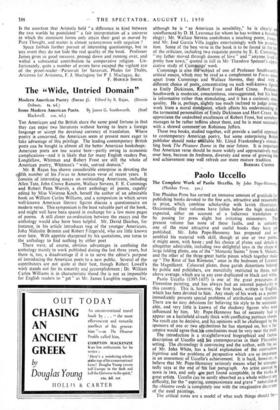Deity and the Philosopher
The Concept of Deity: a Comparative and Historical Study. By E. 0. James. (Hutchinson's University Library. i 8s.) " FOR good or ill, most, if not all, of the great institutions which have formed the framework of society have had their roots in the idea of Deity as a beneficent providential order of transcendental reality." Thus the eminent author of these Wilde Lectures (inter alia) justifies the importance of an objective inquiry into the mean- ing and significance of the concept of Deity, and at the same time defines his subject, in a broad way, for the purposes of historical and comparative study. This is not, however, merely a comparative study, and its conclusions are related to the " more ultimate quests of the philosopher and theologian in their respective searches for a deeper evaluation of the data in terms of validity and truth."
As we have already learned to expect from Professor James, by his many original contributions to anthropology and comparative religion, this is a masterly and comprehensive survey dealing scientifically and sympathetically with a great subject. He casts his net wide, through primitive religion and the various .polytheisms to the higher' eligions of the Orient and the West, treating, in detail, with vital aspects of belief, such as pantheism, anthropomorphism, monolatry, dualism and monotheism, culminating in a general survey of the philosophy of theism, the practical requirements of religion and the doctrine of revelation. The claim to validity of any special revelation, he maintains, falls within the province of an independent inquiry, but the contribution of comparative religion aims mainly at providing " carefully collected and properly assessed data analysed and evaluated in a genuinely scientific, philosophic and sympathetic spirit."
This end Professor lames has, on the whole, achieved with insight and understanding. The comprehensiveness of his field, however, has compelled him to compress much of his detail, and it is, no doubt, for this reason that there occur statements calling for further elucidation or questioning. The emphasis on " spiritual consciousness as the means by which the mystery that lies at the heart of the universe might be known " strikes well at the essence of Hindu religion. But if so, " that art .thou" gives insight into the nature of reality far better than "that is that." (Is this an Oriental phrase ?) The absolute is " another form of conscious- ness," not an " object of thought " or a " conceptual that " (Raju, Hegelianism and Advaita).
The widespread nature of the culture pattern of the divine King is illuminating. The " cult of the Emperor " in China, however, does not so easily fall into line with Emperor-worship. As the worship of Shang-ti was primary, the monarch only had a pro- visional mandate from Heaven, and former Emperors were only worshipped bY the reigning monareh, not by the subjects. The attribution to Newton of the wave-theory of light does not represent his fully considered theory, but only refers to earlier and subsidiary speculations. His final position was on the side of a modified corpuscular theory. In what sense are the theistic argu- ments of Aquinas " an impressive rational demonstration " for the existence of God, if they are "not singly or collectively wholly convincing " ? Mascall's view deserves consideration that " they are not so much five different demonstrations . . . as five different methods of manifesting the radical dependence of finite being on God " (Existence and Analogy).
As an anthropologist Professor James rightly disclaims any attempt to conjecture " absolute " origins of religion, but neverthe- less follows the practice of assuming " relative " origins, on the ground that surviving simple peoples in some respects register pre- historic man. Survivals may well be used as analogies to conjecture the past, but it is doubtful whether' early man can be equated with his sophisticated descendant. Nevertheless, speculation into both absolute and relative origins might be legitimate, if recognised as pure hypotheses, independently of historical and empirical study.
The compression of material is particularly noticeable in the philosophical sections, and the expositions of Plato and Aristotle, for example, deserve treatment at some greater length. Can we be satisfied with the summary statements that the doctrine of God rested " on a single personal ground " or that God was the " trans- cendent sanction of morality" ? We should like to have seen some discussion on the relationship of Deity to the.Ideas, and the ultimate meaning of the Idea of the Good. Are the Ideas, as A. E. Taylor maintained, objects of thought and not creative conceptions in the mind of God, or was St. Augustirie's interpretation of forms as ideas in the mind of God an adaptation of Plato to Christianity ? Is the assertion that Aristotle held " a difference in kind between the two worlds he postulated " a fair interpretation of a universe in which the imminent forms only attain their goal as moved by Pure Thought, and matter is almost synonymous with negation ?
Space forbids further pursuit of interesting questionings, but in any event they do not hide the real quality of the book. Professor James gives us good measure. presscd down and running over, and withal a substantial contribution AO comparative religion. Un- fortunately, quite a number of errors have escaped the vigilant eye of the proof-reader—Parasvati for Sarasvati, Phales for Thales, Aricenna for Avicenna, F. J. Maclagany for P J. Maclagan, &c.
F. HAROLD SMITH.



































 Previous page
Previous page